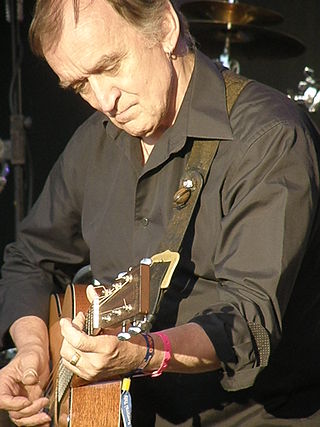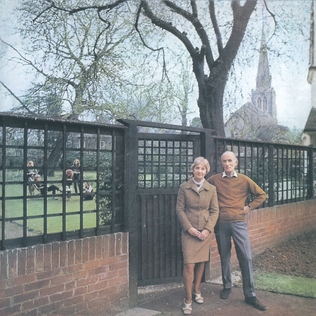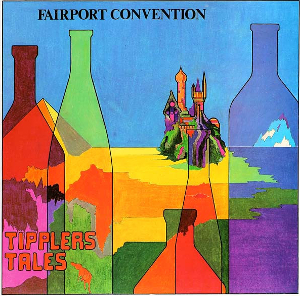Related Research Articles

Martin Dominic Forbes Carthy MBE is an English singer and guitarist who has remained one of the most influential figures in English folk music, inspiring contemporaries such as Bob Dylan and Paul Simon, as well as later artists such as Richard Thompson, since he emerged as a young musician in the early days of the folk revival in the UK during the 1960s and 1970s.

Pentangle are a British folk rock band, formed in London in 1967. The original band was active in the late 1960s and early 1970s, and a later version has been active since the early 1980s. The original line-up, which was unchanged throughout the band's first incarnation (1967–1973), was Jacqui McShee (vocals); John Renbourn ; Bert Jansch ; Danny Thompson ; and Terry Cox (drums).

David Cyril Eric Swarbrick was an English folk musician and singer-songwriter. He was one of the most highly regarded musicians produced by the second British folk revival, contributing to some of the most important groups and projects of the 1960s, and he became a much sought-after session musician, which led him throughout his career to work with many of the major figures in folk and folk rock music.

Herbert Jansch was a Scottish folk musician and founding member of the band Pentangle. He was born in Glasgow and came to prominence in London in the 1960s as an acoustic guitarist and singer-songwriter. He recorded more than 28 albums and toured extensively from the 1960s to the 21st century.

Albert Lancaster Lloyd, usually known as A. L. Lloyd or Bert Lloyd, was an English folk singer and collector of folk songs, and as such was a key figure in the British folk revival of the 1950s and 1960s. While Lloyd is most widely known for his work with British folk music, he had a keen interest in the music of Spain, Latin America, Southeastern Europe and Australia. He recorded at least six discs of Australian Bush ballads and folk music.

Martin Carthy is the debut solo album by English folk musician Martin Carthy, originally released in 1965 by Fontana Records and later re-issued by Topic Records. The album features Dave Swarbrick playing fiddle or mandolin on a number of the tracks. Swarbrick was not headlined on the album for contractual reasons as he was with the Ian Campbell Folk Group at the time with permission granted by Transatlantic Records.

Jack Orion is the third album by Scottish folk musician Bert Jansch, released in 1966. It contains a number of traditional songs, including the epic "Jack Orion": a ten-minute adaptation of the Child ballad "Glasgerion" which tells of a court fiddler’s attempt to seduce a countess and his servant's treachery in successfully impersonating him. A number of songs are performed with friend and fellow guitarist John Renbourn, who would later join him in the group Pentangle. "The Waggoner’s Lad" has Jansch unusually playing the banjo with Renbourn supplying the guitar part.
Anne Patricia Briggs is an English folk singer. Although she travelled widely in the 1960s and early 1970s, appearing at folk clubs and venues in Britain and Ireland, she never aspired to commercial success or to achieve widespread public acknowledgment of her music. However, she was an influential figure in the British folk revival, being a source of songs and musical inspiration for others such as A. L. Lloyd, Bert Jansch, Jimmy Page, The Watersons, June Tabor, Sandy Denny, Richard Thompson, and Maddy Prior.

Unhalfbricking is the third studio album by the English folk rock band Fairport Convention and their second album released in 1969. It is seen as a transitional album in their history and marked a further musical move away from American influences towards more traditional English folk songs that had begun on their previous album, What We Did on Our Holidays and reached its peak on the follow-up, Liege & Lief, released later the same year.
Bill Leader is an English recording engineer and record producer. He is particularly associated with the British folk music revival of the 1960s and 1970s, producing records by Paddy Tunney, Davey Graham, Bert Jansch, John Renbourn, Frank Harte and many others.

Cruel Sister is an album recorded in 1970 by folk-rock band Pentangle. It was the most folk-based of the albums recorded by the band, with all the tracks being versions of traditional songs. Whereas their previous album had been produced by Shel Talmy, and featured quite a heavily produced, commercial sound, Cruel Sister was produced by Bill Leader, noted for his recordings of folk musicians.

Tipplers Tales is a 1978 album by Fairport Convention, the band's thirteenth studio album since their debut in 1968. Recorded in only ten days, it was the last album the band recorded for Vertigo. Simon Nicol later wrote
"We secured a deal with Vertigo, the one that ended up with them paying us not to make records. It seemed a novelty, like that Marx Brothers line: "How much for you NOT to rehearse?" "Oh, you can't afford it." We did Bonny Bunch and Tipplers Tales then didn't make the other four contracted albums"
"Henry Martin" is a traditional Scottish folk song about Henry Martin, a seafarer who turns to piracy to support his two older brothers. Writing in 1975, the musician and folklorist A. L. Lloyd described Henry Martin as "one of the most-sung ballads of our time."
Folk baroque or baroque guitar is a distinctive and influential guitar fingerstyle developed in Britain in the 1960s, which combined elements of American folk, blues, jazz and ragtime with British folk music to produce a new and elaborate form of accompaniment. It has been highly important in folk music, folk rock and British folk rock playing, particularly in Britain, Ireland, North America and France.

Gottle O'Geer is the eleventh studio album by English folk rock band Fairport Convention. The album was released through Island Records in May 1976.
"Down by Blackwaterside" is a traditional folk song, provenance and author unknown, although it is likely to have originated near the River Blackwater, Northern Ireland. Peter Kennedy suggests that the lyrics originated in England, later picking up the best known tune in Ireland. Versions with a different tune have been collected in the English West Country. There is a Blackwater River in South East England.

Cruel Sister, the first album by English folk group Rachel Unthank and the Winterset was released on 11 May 2005 and launched at Holmfirth Festival of Folk. Described by BBC Music as "an outstanding debut", it received support from a number of DJs on BBC Radio 2 and was subsequently awarded Folk Album of the Year by MOJO.

Byker Hill is the third solo album by English folk musician Martin Carthy, originally released in 1967 by Fontana Records and later re-issued by Topic Records. The album features Dave Swarbrick playing fiddle on a number of the tracks.
"Poor Murdered Woman" is an English traditional folk song. On Tuesday 14 January 1834, the events related in the song were reported in The Times.
References
- ↑ Francis James Child, English and Scottish Popular Ballads, "Glasgerion"
- ↑ Roud Folk Song Index, https://www.vwml.org/
- ↑ Francis James Child, The English and Scottish Popular Ballads, v 2, p 136, Dover Publications, New York 1965
- ↑ Lloyd’s sleeve notes to First Person quoted in Reinhard Zierke, ‘Jack Orion’, in Mainly Norfolk: English Folk and Other Good Music Archived 2011-06-10 at the Wayback Machine .
- ↑ Carthy’s sleeve notes to But Two Came By, quoted by Reinhard Zierke.